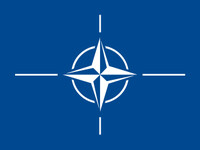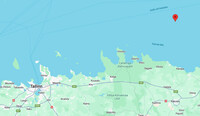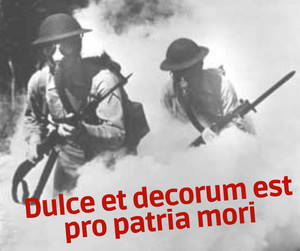Dulce et decorum est
Piegati in due, come vecchi straccioni, sacco in spalla,
le ginocchia ricurve, tossendo come megere, imprecavamo nel fango,
finché volgemmo le spalle all'ossessivo bagliore delle esplosioni
e verso il nostro lontano riposo cominciammo ad arrancare.
Gli uomini marciavano addormentati. Molti, persi gli stivali,
procedevano claudicanti, calzati di sangue. Tutti finirono azzoppati; tutti ciechi;
ubriachi di stanchezza; sordi persino al sibilo
di stanche granate che cadevano lontane indietro.
Il gas! Il gas! Svelti ragazzi! - Come in estasi annasparono,
infilandosi appena in tempo le goffe maschere antigas;
ma ci fu uno che continuava a gridare e a inciampare
dimenandosi come in mezzo alle fiamme o alla calce...
Confusamente, attraverso l'oblò di vetro appannato e la densa luce verdastra,
come in un mare verde, lo vidi annegare.
In tutti i miei sogni, davanti ai miei occhi smarriti,
si tuffa verso di me, cola giù, soffoca, annega.
Se in qualche orribile sogno anche tu potessi metterti al passo
dietro il furgone in cui lo scaraventammo,
e guardare i bianchi occhi contorcersi sul suo volto,
il suo volto a penzoloni, come un demonio sazio di peccato;
se solo potessi sentire il sangue, ad ogni sobbalzo,
fuoriuscire gorgogliante dai polmoni guasti di bava,
osceni come il cancro, amari come il rigurgito
di disgustose, incurabili piaghe su lingue innocenti -
amico mio, non ripeteresti con tanto compiaciuto fervore
a fanciulli ansiosi di farsi raccontare gesta disperate,
la vecchia Menzogna: Dulce et decorum est
Pro patria mori.
http://it.wikipedia.org/wiki/Wilfred_Owen
--- Il testo originale in inglese
DULCE ET DECORUM EST(1)
Bent double, like old beggars under sacks,
Knock-kneed, coughing like hags, we cursed through sludge,
Till on the haunting flares(2) we turned our backs
And towards our distant rest(3) began to trudge.
Men marched asleep. Many had lost their boots
But limped on, blood-shod. All went lame; all blind;
Drunk with fatigue; deaf even to the hoots(4)
Of tired, outstripped(5) Five-Nines(6) that dropped behind.
Gas!(7) Gas! Quick, boys! – An ecstasy of fumbling,
Fitting the clumsy helmets(8) just in time;
But someone still was yelling out and stumbling,
And flound'ring like a man in fire or lime(9) . . .
Dim, through the misty panes(10) and thick green light,
As under a green sea, I saw him drowning.
In all my dreams, before my helpless sight,
He plunges at me, guttering,(11) choking, drowning.
If in some smothering dreams you too could pace
Behind the wagon that we flung him in,
And watch the white eyes writhing in his face,
His hanging face, like a devil's sick of sin;
If you could hear, at every jolt, the blood
Come gargling from the froth-corrupted lungs,
Obscene as cancer, bitter as the cud(12)
Of vile, incurable sores on innocent tongues,
My friend, you would not tell with such high zest(13)
To children ardent(14) for some desperate glory,
The old Lie; Dulce et Decorum est
Pro patria mori.(15)
Notes on Dulce et Decorum Est
1. DULCE ET DECORUM EST - the first words of a Latin saying (taken from an ode by Horace). The words were widely understood and often quoted at the start of the First World War. They mean "It is sweet and right." The full saying ends the poem: Dulce et decorum est pro patria mori - it is sweet and right to die for your country. In other words, it is a wonderful and great honour to fight and die for your country.
2. Flares - rockets which were sent up to burn with a brilliant glare to light up men and other targets in the area between the front lines (See illustration, page 118 of Out in the Dark.)
3. Distant rest - a camp away from the front line where exhausted soldiers might rest for a few days, or longer
4. Hoots - the noise made by the shells rushing through the air
5. Outstripped - outpaced, the soldiers have struggled beyond the reach of these shells which are now falling behind them as they struggle away from the scene of battle
6. Five-Nines - 5.9 calibre explosive shells
7. Gas! - poison gas. From the symptoms it would appear to be chlorine or phosgene gas. The filling of the lungs with fluid had the same effects as when a person drowned
8. Helmets - the early name for gas masks
9. Lime - a white chalky substance which can burn live tissue
10. Panes - the glass in the eyepieces of the gas masks
11. Guttering - Owen probably meant flickering out like a candle or gurgling like water draining down a gutter, referring to the sounds in the throat of the choking man, or it might be a sound partly like stuttering and partly like gurgling
12. Cud - normally the regurgitated grass that cows chew usually green and bubbling. Here a similar looking material was issuing from the soldier's mouth
13. High zest - idealistic enthusiasm, keenly believing in the rightness of the idea
14. ardent - keen
15. Dulce et decorum est pro patria mori - see note 1 above.
These notes are taken from the book, Out in the Dark, Poetry of the First World War, where other war poems that need special explanations are similarly annotated.
Allegati
Dulce et decorum est
Owen657 Kb - Formato pngPoesia sulla prima guerra mondiale
Articoli correlati
 Norway backtracks
Norway backtracksStoltenberg and the suspension of the Norwegian sovereign wealth fund's ethics rules
Restrictions on investments in companies implicated in human rights abuses or weapons production have been suspended. The suspension of ethics rules was approved on November 4, 2025, by the Labour-majority Parliament.6 novembre 2025 - Redazione PeaceLink Marcia indietro della Norvegia
Marcia indietro della NorvegiaStoltenberg e la sospensione delle regole etiche del Fondo sovrano norvegese
Sono stati sospesi i vincoli contro gli investimenti in aziende coinvolte in violazioni dei diritti umani o nella produzione di armi. La sospensione delle regole etiche è stata approvata il 4 novembre 2025 dal parlamento a maggioranza laburista.6 novembre 2025 - Redazione PeaceLink Il terrorismo di destra è stato supportato da uomini collegati alla Nato e della CIA
Il terrorismo di destra è stato supportato da uomini collegati alla Nato e della CIAUna regia "atlantica" dietro la strage di Bologna del 1980
La sentenza parla di "cornice piduista" in una "prospettiva politica atlantista". Oltre al ruolo di Licio Gelli nella strage emerge infatti quello di Federico Umberto D’Amato, amico di Cossiga e affiliato alla P2, e già rappresentante del Ministro dell’Interno nel Comitato di Sicurezza della Nato.27 ottobre 2025 - Alessandro Marescotti Un'analisi critica dell'episodio dello scorso 19 settembre
Un'analisi critica dell'episodio dello scorso 19 settembreI Mig-31 russi hanno violato lo spazio aereo dell'Estonia?
Una importante agenzia stampa ha riportato che "i Mig-31 hanno sorvolato la capitale Tallin per 12 minuti prima che jet italiani fossero inviati a intercettarli". Ma i Mig-31 non hanno volato sulla capitale estone. Le cose sono andate diversamente e abbiamo scoperto cose molto interessanti. Eccole.28 settembre 2025 - Alessandro Marescotti

Sociale.network